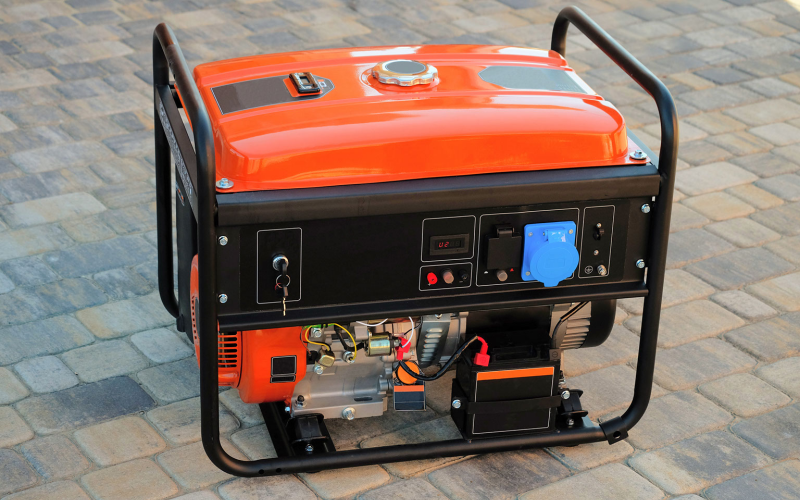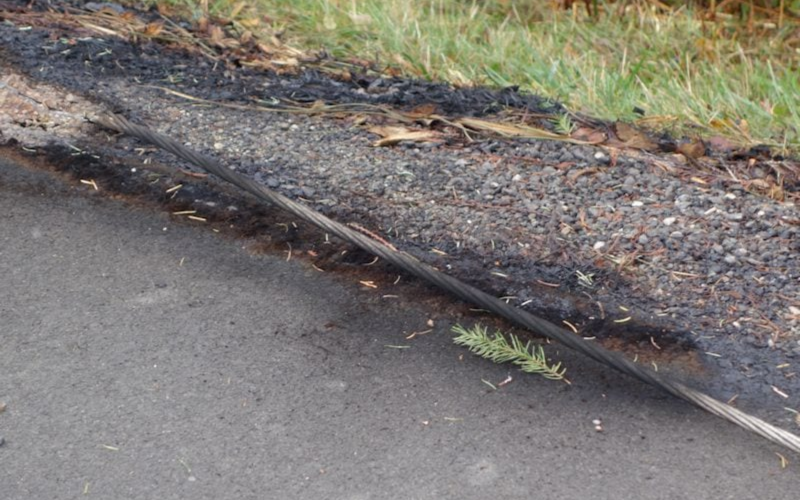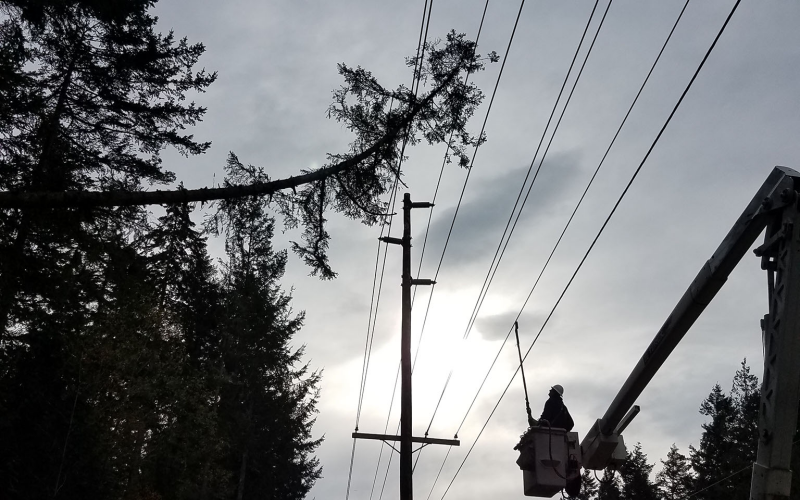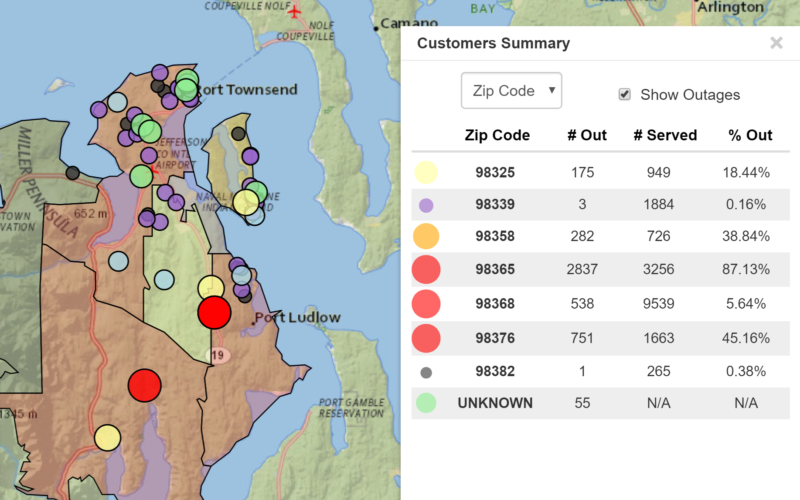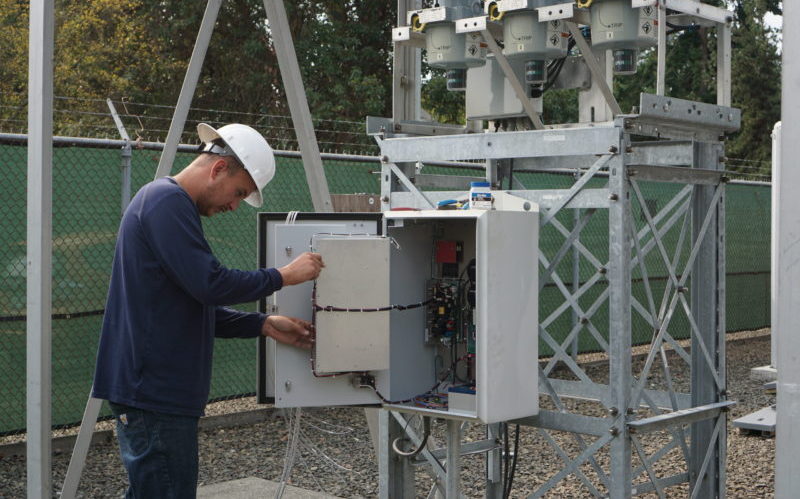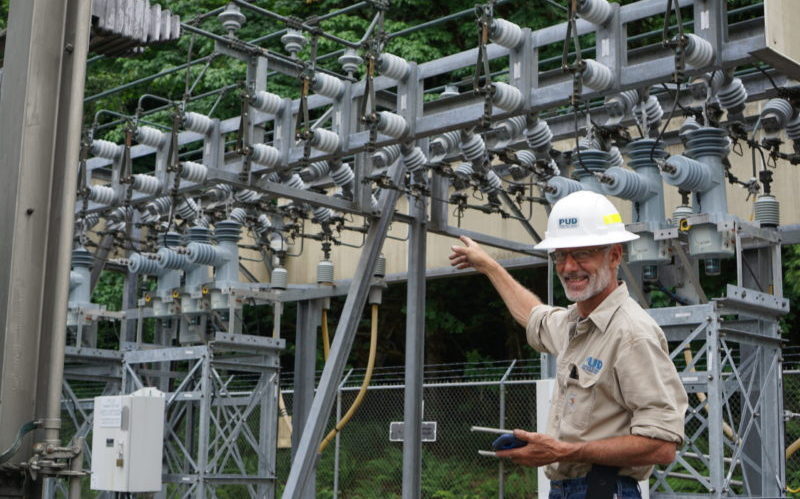There are numerous forces of nature that can disrupt your electrical service. The most common is a good old fashioned Pacific Northwest wind storm. The most feared is a large earthquake and an associated tsunami. Below are some links and resources that can help you prepare for these regional threats.
How Can You Prepare Ahead of Time?
All Jefferson PUD customers should prepare a plan and assemble an emergency kit well in the advance of a strong storm or earthquake event. Kits can be as simple as your camping/backpacking equipment in a storage container with some notable additions (cell phone, emergency phone list, battery powered or crank radio, etc). You should not be planning when you hear about a weather warning in your area or after an earthquake strikes. Stores may not have the supplies in stock you will need to ride out several days without power.
Before a power outage:
- Prepare a safety kit with a flashlight, batteries, bottled water, non-perishable food, blankets, warm clothing, emergency phone numbers, battery-powered radio, a first aid kit and other items you might need if power is out for several days. There are some great checklists on the Take Winter By Storm website – a site dedicated to emergency preparedness in Western Washington.
- Stock up on pantry dried goods such as rice, canned foods, dried soups/noodles, trail mixes and non-perishable entrees. If you use a camp or propane stove, DO NOT USE IT INDOORS. Carbon monoxide deaths are very common during prolonged outages.
- If a storm is predicted, make sure your vehicle has plenty of gas. When power is out, gas pumps at service stations typically don’t work. Also keep cell on the charger as long as possible if a major storm is anticipated. You may need it if the land lines go down.
- If a storm is predicted, we advise you use the National Weather Service in Seattle as your source for weather information. Pay particular attention to Watches, Warnings and Advisories as they will offer information regarding timing, strength and duration of winds.
- If your garage has an electric door opener, locate the manual release lever and know how to operate it.
- Plan ahead ways to keep foods cold. Use freeze-pack inserts and keep them frozen. Use a cooler. Freeze water in plastic jugs or containers or store bags of ice.
- Install surge protectors and/or battery systems for computers, flat screen TVs, etc. If a permanent generator installation is desired, consult a licensed electrician to install an approved transfer switch. Do not connect a generator directly into your home’s main fuse box or circuit panel. View our Generator Safety Page for more info.
- Educate yourself on how to prevent carbon monoxide poisoning.
During a power outage:
- Call Jefferson PUD (360 385 5800) to report a power outage. If no one has answered, we are likely processing many calls and/or turning the phones over so that all customer service representatives can field incoming calls.
- If you cannot get through initially, please wait about 5 minutes and try again. During a major outage Jefferson PUD will have a short outgoing message describing the outage and where it is. Generally, we will not provide information regarding when power will be restored during a major storm event.
- Listen to local radio stations such as KPTZ (91.9 FM) or KSQM (91.5 FM) for emergency management status updates. If you have cellular data service, get up to date info from the PUD on Twitter, Facebook, or via our website.
- Turn off lights and appliances, including your furnace, and unplug sensitive electronic devices, like computers to avoid a circuit overload when power is restored. Leave one light switch on so you’ll know when service returns.
- Keep freezer and refrigerator doors closed; open them only when necessary. Food will usually stay frozen for 36-48 hours in a fully loaded freezer if you keep the door closed. A half-full freezer will generally keep food frozen for 24 hours
- Do not use gasoline-powered machinery, such as generators in any enclosed space; toxic fumes kill! Operate generators outdoors. Plug appliances directly into the generator using heavy duty, properly grounded extension cords that aren’t worn or frayed.
- Do not use charcoal grills indoors. Dangerous carbon monoxide generated from them and other fuel-burning devices can and do kill people every year.
- Do not use a gas range or oven for room heating. A fuel-burning heater, such as a kerosene heater, requires plenty of ventilation to prevent buildup of harmful fumes. Place heaters on a hard, stable surface away from flammable materials. Never leave children or pets alone when using a portable heater.
- Drive Carefully if you leave your home. If driving and traffic signals are out, treat the intersection as a four-way stop.
How is the PUD Staying Prepared?
There are many things the PUD can do internally to prepare for outages and how to respond. Operationally, we have connected our substations with fiber optics so that we can monitor and control devices enabling us to respond quicker to a problem. Maintenance-wise, we are trimming trees that would otherwise grow into or fall onto our lines during a wind event. Downed trees are a frequent cause of outages. Local contractors are ready to assist anytime they are needed to remove fallen timber. In the event of a large storm event, should our crews get overwhelmed, we have mutual assistance agreements with other PUDs in the state who could assist us during a major storm or disruption. Last, but not least, the PUD coordinates with local emergency management to address priorities and maintain communications between the utility and emergency services.
